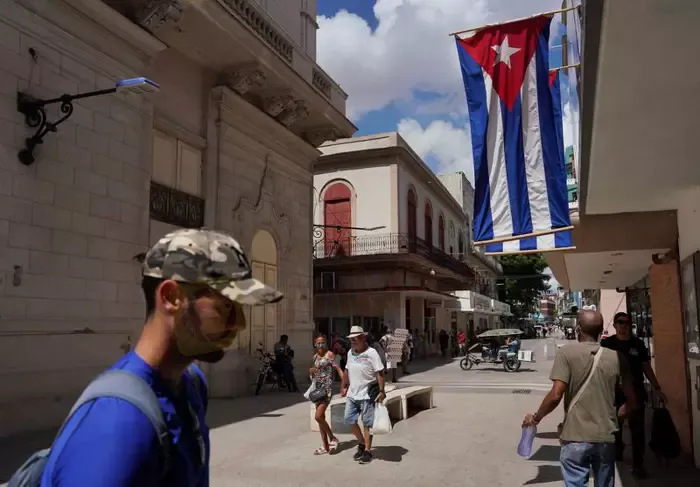简体中文
繁體中文
English
Pусский
日本語
ภาษาไทย
Tiếng Việt
Bahasa Indonesia
Español
हिन्दी
Filippiiniläinen
Français
Deutsch
Português
Türkçe
한국어
العربية
Cuba more than quadruples dollar/peso exchange rate
Abstract:Cuba announced it will begin purchasing on Thursday dollars and other convertible currencies at nearly five times the current rate in an effort to undercut the informal money market and capture the funds.

Central Bank President Marta Wilson Gonzalez, appearing on state-run television on Wednesday evening, said the state-run banking system had set a new rate of 120 pesos to the dollar, compared to the official fixed rate of 24 pesos, and 115 pesos on the informal market, according to independent online news outlet El Toque tracker, the most watched in the communist-run country.
Gonzalez said the new rate would float and did not apply to most activities of the state-dominated economy which would still operate at the fixed rate in effect for more than 18 months.
Cuba stopped accepting dollars in 2020 citing U.S. sanctions and stopped selling convertible currency for pesos to the public soon after, stating it simply did not have the cash.
Economy Minister Alejandro Gil, appearing with the central bank president on Wednesday, said in the near future he hoped to resume currency exchanges, but the first step would be capturing the informal market.
“Today there is a high level of foreign currency that is entering the country that is not being captured by the national financial system,” he said.
Hit by harsh new U.S. sanctions, the pandemic and current high international prices for goods and shipping, the near-bankrupt, import-dependent economy grew 1.3% last year after declining 10.9% in 2020. Gil said a gradual if slow recovery continued without giving figures.
Shortages of food, medicine, fuel and now electricity have led to scattered protests in recent months.
Pavel Vidal, a former Cuban central bank economist who teaches at Colombias Pontificia Universidad Javeriana Cali, said the measure addressed a major complaint of tourists who exchanged money at the fixed government rate in hotels and then discovered outside on the street everything is pegged at the informal rate.
Vidal said it would also benefit “the private sector which often receives foreign currency from tourists and that the banks will once more accept and exchange physical dollars at 120 which unlocks one of the major impediments that remittances had as they were fetching 24 pesos.”

Disclaimer:
The views in this article only represent the author's personal views, and do not constitute investment advice on this platform. This platform does not guarantee the accuracy, completeness and timeliness of the information in the article, and will not be liable for any loss caused by the use of or reliance on the information in the article.
Read more

The Withdrawal Trap: How Scam Brokers Lure Victims into Paying More
In the world of online trading, the promise of quick profits and seamless transactions often masks a darker reality. One of the most insidious tactics employed by fraudulent brokers is blocking withdrawals, that is a deliberate strategy designed to trap traders and investors into paying more money under false pretences.

Common Tactics Used in Online Trading Fraud Today
Know the top online trading scams of 2025, from fake apps to pump-and-dump tricks. Simple tips to spot and avoid them, keeping your money safe in this easy guide.

RM1.29 Million Lost in ‘C Baird VIP’ WhatsApp Scam
A 43-year-old company auditor and subcontractor in Malaysia became the latest victim of an elaborate investment scam after losing RM1.29 million to a fraudulent scheme promoted via WhatsApp.

U.S. March ISM Manufacturing PMI Released
The U.S. March ISM Manufacturing PMI data shows that manufacturing has contracted for the first time, and investors should pay attention to future changes and impacts on the sector.
WikiFX Broker
Latest News
Exposing the Top 5 Scam Brokers of March 2025: A Closer Look by WikiFX
Gold Prices Climb Again – Have Investors Seized the Opportunity?
Webull Launches SMSF Investment Platform with Zero Fees
Australian Regulator Warns of Money Laundering and Fraud Risks in Crypto ATMs
FCA Warns Against 10 Unlicensed or Clone Firms
CySEC Warns Against 14 Unlicensed Investment Websites
Top Currency Pairs to Watch for Profit This Week - March 31, 2025
Will natural disasters have an impact on the forex market?
Philippines Deports 29 Indonesians Linked to Online Scam Syndicate in Manila
The Withdrawal Trap: How Scam Brokers Lure Victims into Paying More
Currency Calculator








